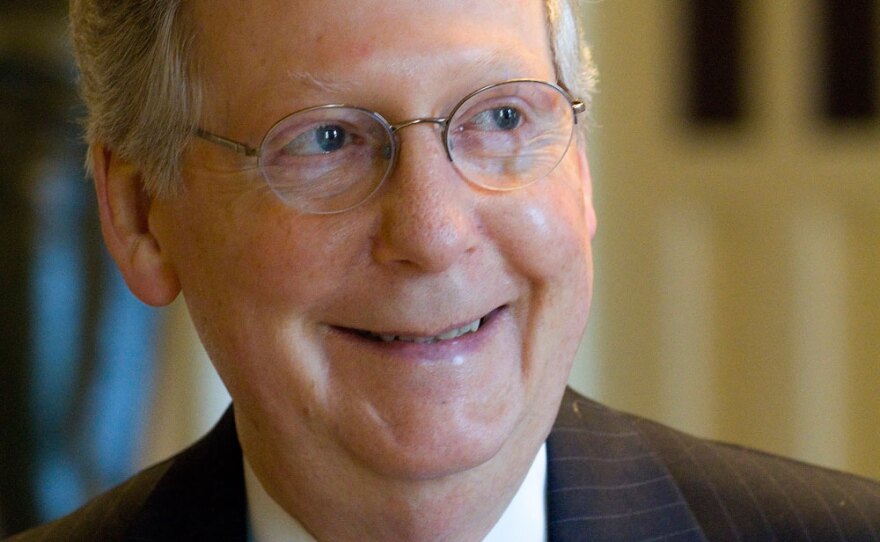Betting on the wrong horse is nothing new in the home of the Kentucky Derby. But when it happens to the most prominent Republican in that state, and arguably the nation, heads turn.
The race in this case was Kentucky's GOP Senate primary on Tuesday, and the establishment candidate whom Senate Republican leader Mitch McConnell put his chips on lost by a long shot.
That loss by Kentucky Secretary of State Trey Grayson -- to Tea Party candidate Rand Paul -- has put McConnell in a tough spot.
As a rule, McConnell does not make endorsements. But he made an exception just two weeks before Kentucky's primary. Grayson had been hand-picked by McConnell to succeed Kentucky's junior senator, Jim Bunning, after the GOP leader all but pushed Bunning into retirement.
But McConnell's endorsement backfired. Grayson lost by 24 percentage points to Paul, an eye surgeon and the son of Rep. Ron Paul of Texas, a 2008 GOP presidential candidate.
Asked what lessons, if any, he takes away from this setback, all McConnell would say was: "We're having a unity rally down at the state headquarters Saturday and [will] try to pull the party together behind the nominee."
That could be a challenge. McConnell, after all, is the ultimate Washington insider -- this year alone he has requested $600 million in earmarks for Kentucky -- while Paul and his Tea Party are anti-Washington and anti-spending.
A Paul Problem?
Some of the Senate's most conservative Republicans think McConnell is out of touch. One of them is none other than Bunning, his fellow Kentuckian. "I think there are a lot of us in the Republican Party that want to see Rand Paul and his voting and how he will vote in the U.S. Senate the position of the Republican Party," Bunning said.
When asked if McConnell represents that position, Bunning responded, "Not all the time."
On the other hand, Paul has said some startling things since the primary. He was asked on Wednesday's All Things Considered if he thought the 1964 Civil Rights Act and the Americans with Disabilities Act were overreaches by the federal government -- and that businesses shouldn't be bothered by people suing for redress based on those laws.
Paul replied he thought a lot of things could be handled locally. The next day, Paul issued a statement declaring he did support the Civil Rights Act.
This has left some prominent Senate Republicans cringing, including South Carolina's Lindsey Graham. "I don't know how this plays out," Graham said. "Rand Paul has to explain himself, not me, and he has to show to people that he's got, you know, sound judgment."
Utah Republican Orrin Hatch, for his part, urged a group of reporters at the Capitol to give Paul some leeway. "Libertarians tell what comes to their minds, but sometimes to be around you wonderful people, you have to have a little bit of experience," Hatch said with a laugh, "or you're going to get your heads handed to you."
The First Test: Party Unity Rally
McConnell has not said "I told you so" publicly, but congressional expert Jack Pitney of Claremont McKenna College said he certainly has grounds to do so. "I think people in the political elite are going to look at this and say, 'You know, Mitch McConnell probably was pretty wise to support the other candidate, because Rand Paul has some troubles,' " Pitney said. "He may still win, but the election might be closer than it would be otherwise."
So does having bet on the loser in Kentucky hurt McConnell? Texas Republican John Cornyn doesn't think so.
"I don't think it'll affect his clout here in Washington, because I don't think it's based on what happens in a primary in Kentucky," he said. "I think it's based on his effectiveness here as the Republican leader."
How hard McConnell will campaign for Paul, though, remains to be seen. Claremont McKenna's Pitney said the first test will be Saturday's party unity rally at Republican headquarters in the Mitch McConnell Building in Frankfort.
"This is going to be like a Thanksgiving dinner in a dysfunctional family," Pitney said. "There will be awkward pauses and meaningful glances exchanged."
Still, Pitney says McConnell has little choice but to stand by the insurgent he so recently opposed.
Copyright 2022 NPR. To see more, visit https://www.npr.org. 9(MDAzMjM2NDYzMDEyMzc1Njk5NjAxNzY3OQ001))







